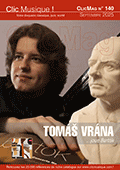 Si dans toute l'Europe baroque, les trompettes ajoutent panache, éclat et grandeur au déploiement musical requis en maintes circonstances célébratives à l'église, à la cour, ou pour quelque évocation de faits héroïques au théâtre, c'est principalement et tout naturellement en Italie où naît le concerto que l'instrument finit par acquérir sa nouvelle dimension de soliste. Tout autant italophile que francophile, Telemann observe puis signe sans doute les premiers concertos pour trompette en terre allemande. Ces pièces brillantes d'invention mélodique ont déjà fait l'objet de plusieurs enregistrements. Après plusieurs auditions de celui-ci, le phénomène constaté ne disparaît pas : le Hambourg de Telemann est devenu un port que ne semblent plus atteindre, sinon les déferlantes d'une théâtrale Tempesta, du moins ces flux et reflux que le maître esthétisa dans sa fameuse « Wassermusik » sans sacrifier la concrétude de leur matérialité. Plus essentiel que le degré de réalisme d'un tableau réussi, le principe du mouvement pourrait presque concentrer à lui seul l'essence du baroque. Imaginez en totale contradiction un monde épargné par les soubresauts décisifs qu'un Harnoncourt ou qu'un Goebel, deux Telemaniaques de génie (des « Tafelmusik » d'anthologie), offrirent comme salut à un univers musical alors encore méconnu ou mal compris. Las, tout s'écoule paisiblement, proprement, sans remous, sans couleurs, benoîtement campé à mi-chemin entre rugosité et sensualité, entre dépouillement et luxuriance. L'unique occasion de s'en consoler est offerte par l'écriture plus contrapuntique des pièces de musique de chambre qui leur permet de mieux supporter un traitement indifférent. Quand bien même nos musiciens auraient contourné la séduction des sens pour viser l'essence, l'auditeur doit savoir qu'il n'aura finalement droit ni à l'une ni à l'autre. (Pascal Edeline)  As a Hamburg-based musician Matthias Höfs has a special relationship with Georg Philipp Telemann, who was a very successful composer of operas at the city’s opera house on the Gänsemarkt. As director of music for the five parish churches of Hamburg, Telemann made a decisive contribution to the sacred music performed at those institutions. And it has not taken the 250th anniversary of his death, on June 25, 2017, for Telemann to be acknowledged as one of the most efficacious Baroque composers alongside J.S. Bach and G.F. Handel. Matthias Höfs played solo trumpet in opera for 16 years with the Philharmonic State Orchestra of Hamburg and now gives concerts all over the world, enjoying an acclaimed reputation. On his new CD the star trumpeter presents works by Telemann together with the estimable Deutsche Kammerphilharmonie Bremen. Matthias Höfs is well aware of Telemann’s versatility. The fact that this Jack-of-all-trades made a significant contribution to the trumpet literature and composed three trumpet concertos is not widely known. “We are all familiar with the brilliant trumpet parts in the works of Bach, Handel and Vivaldi, such as the Christmas Oratorio, the B minor Mass and Messiah. Telemann occupies a special place in the ranks of the Baroque composers when it comes to us trumpet players, because neither Bach nor Handel dedicated a single solo concerto to the instrument. Telemann composed no fewer than three fantastic trumpet concertos and a sonata, which are for me among the loveliest of their genre,” the musician says. As well as performing Telemann’s original trumpet concertos, Matthias Höfs presents delicate chamber music works for a small ensemble on his new album; all works which cannot be played in this way on a historic Baroque trumpet. In this way, he illustrates the instrument’s development over the past 300 years. Colourful music-making is equally possible on modern trumpets, while today’s musicians benefit from the technical refinements of present-day instruments. In the Deutsche Kammerphilharmonie of Bremen the trumpeter has found his ideal musical partners for this project. The ensemble has enthused international audiences with energetic music-making and its extraordinary sound. “It was a sheer delight for me to re-discover Telemann’s music with the musicians of the Deutsche Kammerphilharmonie,” admits Matthias Höfs.
 |
